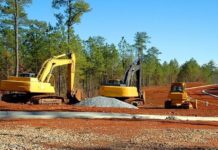Becoming a land developer is a dream job for some. The idea of being your own boss and making a good amount of money whilst working with an array of different people and organisations can be a strong pull into this profession. But if you have decided you want to be a land developer, yet you are unsure how to go about it, don’t worry, we can help. There are many different ways you can become a land developer, so here are some helpful steps to help you to realise your dream.
Work Experience
The idea of starting at the bottom rung of the ladder may well not appeal to some people, but land development is extremely tacit knowledge based, so you want to be in the environment that can give you invaluable insight into this industry. Even if you are applying for jobs and work experience below the standard you are working at in your current industry, it will be worth it to see how a professional organisation deal with land development. It will develop key skills and understanding that will help you move up the ladder. Consider what type of area you want to specialise in when it comes to being a land developer. Is it the legal and permit aspect of the development or is it the planning phase? Depending on the answer to the above questions will help you determine which path you are likely to want to take.
Skills Crossover
You don’t need a prescribed set of skills that will definitively make you a land developer, a successful land developer has an array of skills that can often be applied to all aspects of planning. You want to assess what skills you currently have and look at which areas you may need to develop. If you are an excellent negotiator but you aren’t up together on local laws, permit regulations and building legalities, it is worth up skilling in these areas. Any upskilling you do make sure it links to land developing. Skills such as architectural design, property law and real estate can help you cross over some of the skills you already have and help you to achieving the land developer title.
College Degree

A degree such as finance management, engineering and architecture are all different paths that lead to the same destination.
More often than not, big development firms are looking for college graduates as intern land developers, so a degree in a relevant field could certainly help.
Whilst you won’t be starting at the top of the ladder straight away, you will be placed in a higher position than someone that has no experience in the field. In land developer positions, educational attainment can mean a lot, especially when you have specialist skills in areas such as planning, urban development and other sort after skills.
Partnering and Collaboration
If you don’t have a relevant degree and you don’t want to start at the bottom of the ladder again you may think that changing careers is off the cards but your skills are always going to be valuable, especially if you have worked in high pressure environments. Look for opportunities to collaborate with land development in innovative ways, whether it is offering your skills as a finance strategist or analyst, you don’t know what skills they may need to help them with their next project.
Capital Provider
If you have the money but not the industry knows how to become a land developer, why not look to back projects financially? You won’t get the same level of insight as if you were to undertake any type of work experience or internship but providing the controlling amount of capital that can get a project off the ground can give you some incredible insight, mainly at board level. This type of access would only usually be given to people in high up positions, but as you are providing capital, you may also be entitled to be there as a major stakeholder in the project. You can use the insight gained to increase your level of understanding and help fund further projects in return for more involvement.
Self-Employment Or Contracting
If you have been working in the property management industry, planning, architecture or have any other skills that can be applied to land development, why don’t you consider going self-employed or contracting and working alongside an already established company? There are multiple benefits contracting or being self-employed, namely you get to dictate your rates and the conditions under which you work. If you are working off the back of an already established organisation, you will find that there is less risk involved than alternative courses of action but this may be a difficulty way into the industry and you might need to know people in the firm that can help you in.
Going It Alone
If you don’t think stand much chance at getting in with an already established firm as a contractor, you can always look to start up your own firm. Whilst this may be risky, if you have exceptional industry knowledge and you want to capitalise on it, why wouldn’t you want to go it alone? You can select the projects you want to work with as well as the people, so you can not only become your own boss, you see more of the profit earned which you can then either take or feed back into your business so you can expand.
Final Considerations
Land development isn’t for everyone and you need to be a versatile individual with a wide range of skills in order to not only be successful, but to also enjoy the job. If you haven’t started your career out as a land developer, there are multiple ways into the industry, from skills cross overs to offering finance and funding programmes. Whereas, if you are just about to go to college and have considered this path, there are multiple degrees that will make sure you can get straight onto the career ladder as soon as you graduate. Likewise, if you have property experience you could also try your hand at being your own boss and going self-employed. No two days will ever be the same in land developing, but you will also need to ensure you stay on top of your game if you are to succeed.





















